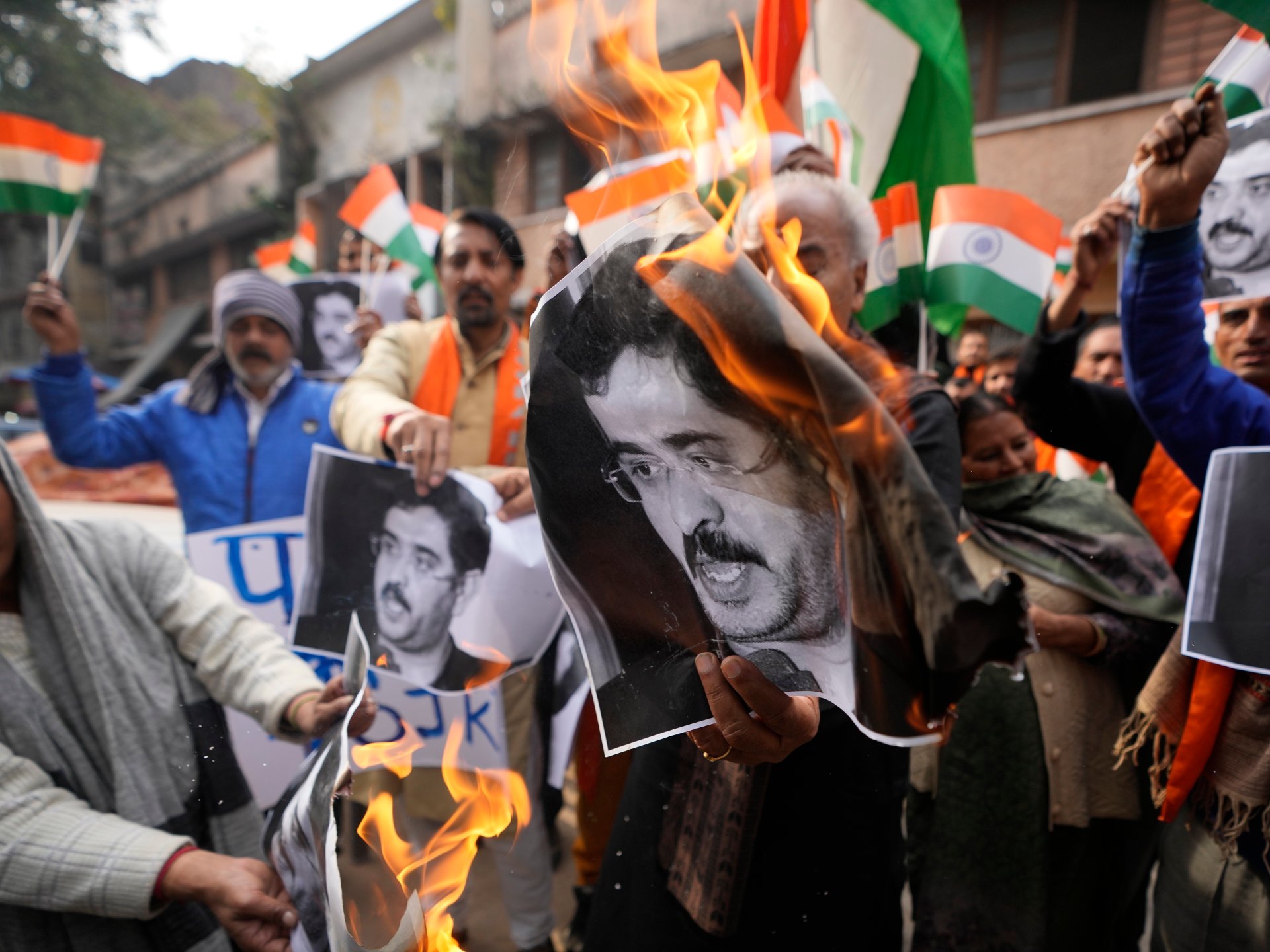
New Delhi, India – India's Prime Minister Narendra Modi, 73, appears set for a rare third term and is likely to be re-elected by an overwhelming majority, polls showed on Saturday night, crushing the opposition coalition in the world's biggest democratic vote in history.
If the official results released on Tuesday, June 4, confirm these polls, Modi’s Bharatiya Janata Party (BJP) will not only emerge unscathed by growing inequalityrecord high unemployment and rising prices, but could do better than in the last election in 2019. Never before has a prime minister in independent India won three Lok Sabha elections in a row, achieving better results each time.
At least seven exit polls published by Indian media predicted that the BJP and its allies would win between 350 and 380 of the 543 seats in the Lok Sabha, the lower house of the Indian parliament.
The opposition Alliance INDIA – a coalition of more than two dozen political groups seeking to topple the Hindu majority BJP government – refused to consider the exit poll results and remained stoically convinced that it would win a majority on election day.
Exit poll results in India are patchy, and previous surveys have both underestimated and overestimated the number of parties. But they have mostly correctly predicted the larger trends of the past two decades – with a few exceptions. Nearly a billion Indians were registered to vote in the massive election in seven phases, which spanned six weeks and ended on Saturday evening.
“Modi is extremely popular. There's a reason why this BJP campaign was all about Modi,” says Neelanjan Sircar, senior fellow at the Centre for Policy Research (CPR) in New Delhi. “There were certain narratives that suggested people were angry with the government, but translating that into seats was always going to be a challenge.”
BJP expands into new areas
While the opposition bloc INDIA is predicted to do well in the southern states of the country, most post-election polls suggest that the BJP could make astonishing breakthroughs there as well.
Several polls predict that the BJP could win two or three seats in Kerala, the last stronghold of the Indian left, where Modi's party has never won. In Tamil Nadu, where it lost nothing in the last election, the BJP could win one or three seats. These electoral victories, if they materialize, could give the BJP a foothold in opposition strongholds where it has struggled for decades.
The BJP and its allies are also likely to retain their seats in Karnataka: in 2019, the BJP won 25 of 28 seats in this state. In Telangana, it could even emerge as the biggest single winner. These results would be a dramatic setback for the opposition Congress party, which leads the INDIA alliance and won the state elections in both Karnataka and Telangana just last year – against the BJP.
“The gains in the south are surprising. And forecasts point to a massive gain,” said Asim Ali, a political commentator. “Even if the BJP does not get as many seats, [as predicted in the exit polls]the increase in their vote share is a big change.”
Meanwhile, the BJP is expected to score major victories in its strongest states, including Gujarat, Madhya Pradesh, Chhattisgarh, Delhi, Uttarakhand and Himachal Pradesh.
The opposition alliance is expected to make slight gains in Bihar and Rajasthan – both states where the BJP almost won a landslide victory in the last election – as well as in the northern states of Haryana and Punjab.
Sudha Joshi, a 76-year-old voter from Chittorgarh in Rajasthan, did not take her eyes off her smartphone as news anchors complained to each other on Saturday night about a “thunderous mandate” for Modi. She got the smartphone last year as part of a welfare scheme of the then Congress government in the state.
Last December, Rajasthan voted out the Congress Party and brought the BJP back to power in the state.
Joshi's political loyalties have also changed. Born in 1947, when India gained independence, Joshi has never missed an opportunity to vote, she says. A traditional Congress voter, Joshi says she has lost hope in the Nehru-Gandhi family that dominates the party and instead sees Modi as a leader.
“When Modi first came to power in 2014, I saw a leader who would lead India to international prestige,” she said, jubilant about the exit polls. “We are happy with his governance because he is a religious person like us, a true patriot.”
Their views reflect a broader mood, analysts say.
“A large section of society today can only imagine a man like Modi at the helm – someone 'you can believe in' – as a leader,” said Sircar of the CPR. “The BJP owes its success to Modi's popularity.”
Zafar Islam, a national spokesman for the BJP, said post-election polls reflected that voters “appreciated the BJP's model of governance, its social programs and Prime Minister Modi's vision.”
“People's living standards have improved under Modi's leadership and that is why we are looking forward to a historic verdict,” he told Al Jazeera.
Five more years of BJP dominance?
Modi’s re-election campaign was riddled with scaremongeringin which he and the BJP continually portrayed the Prime Minister as the saviour of the large Hindu population against a conspiracy of the opposition for the benefit of the Muslims, which he described as “Infiltrators” and “those with more children” at campaign rallies.
With an estimated population of 200 million people, India is home to the third largest Muslim community in the world after Indonesia and Pakistan.
The opposition, meanwhile, was trying to corner Modi on issues of social justice and equality, an issue that struck a chord with Vikrant Singh, a 21-year-old politics student.
Singh had travelled more than 160 km to return home to Pratapgarh in Uttar Pradesh to vote against the BJP, he said. “State universities are getting more expensive and unemployment is rising rapidly,” he said. “I have almost completed my graduation and have no job opportunities to look forward to.”
He was voting for the first time and for Indians his age, the previous Congress government – the party was last in power between 2004 and 2014 – is just a distant memory. And the future, he said, does not look bright.
“The BJP's main focus is on winning elections rather than governing,” he said. “They are seeking cultural hegemony and want to win the minds of the youth by controlling the information media.”
In Uttar Pradesh, India's largest state, the BJP along with its allies is expected to win more than 65 of 80 seats, compared to 62 in the last election. After the exit polls were released, Modi said the opposition alliance had “failed to strike a chord with voters”.
“Through the election campaign, they have only strengthened their competence in one thing: Modi-bashing. This regressive policy is rejected by the people,” he wrote on X.
If the election results confirm the post-election polls, Sircar said India could spend another five years “under the centralized coalition of Modi and Amit Shah,” referring to the country's home minister, who is widely seen as the prime minister's deputy.
“This BJP only knows this way of working: a government in which power is completely centralized at the top.”






Recent Comments